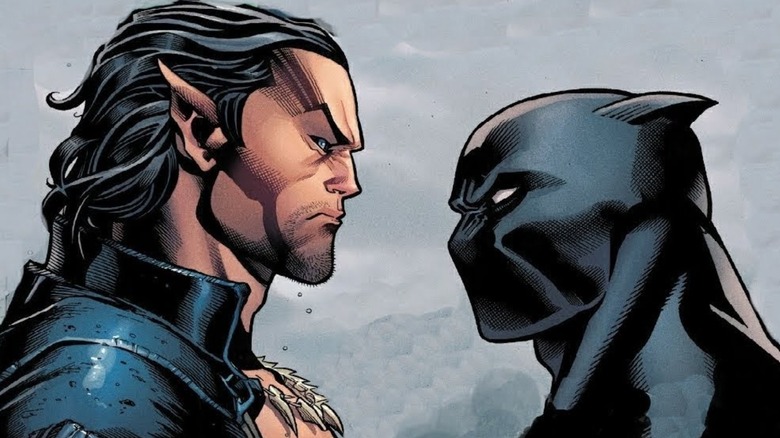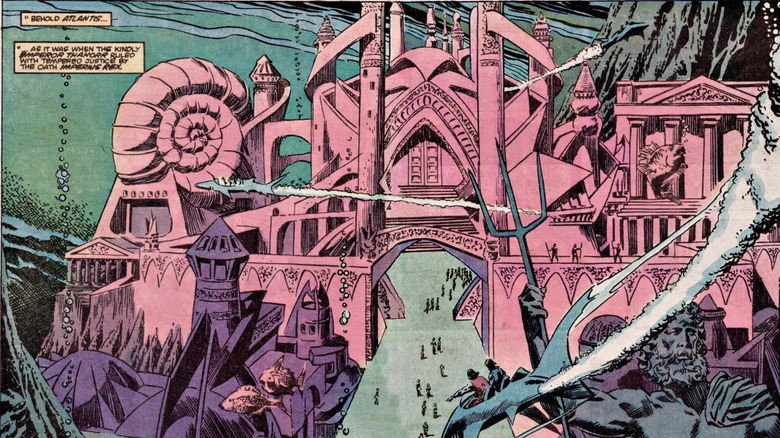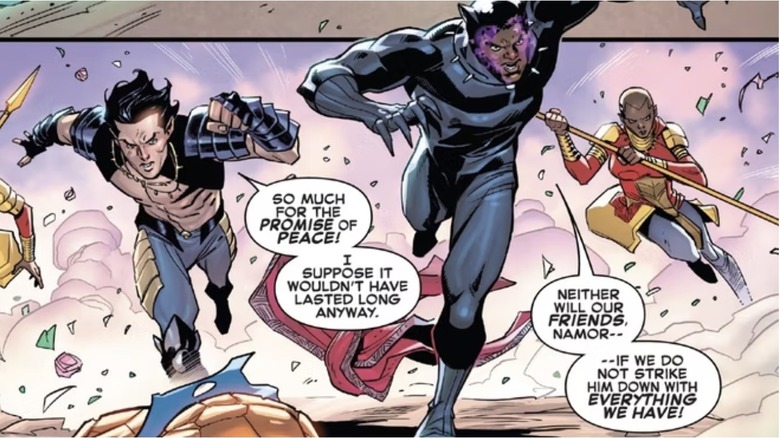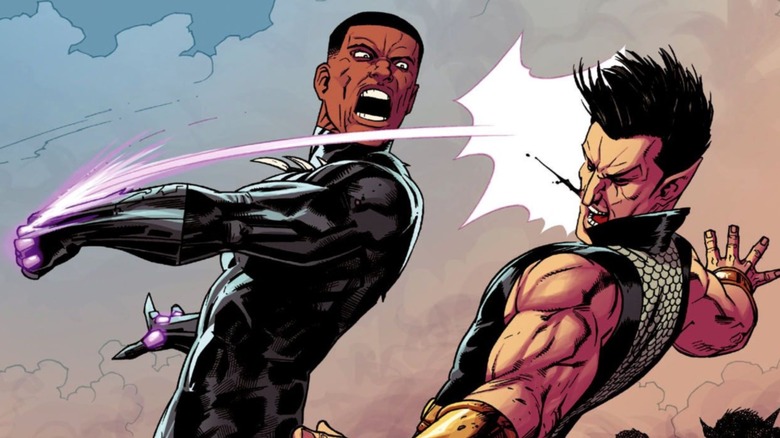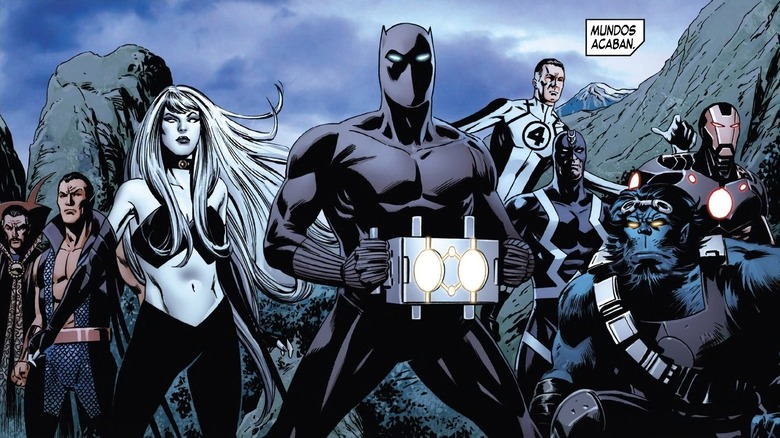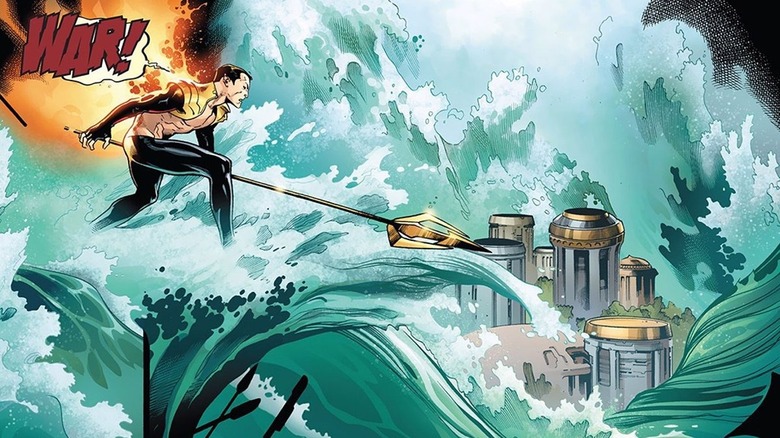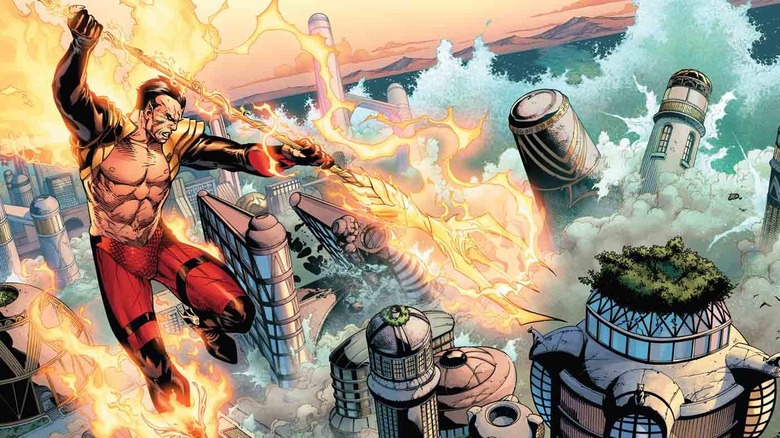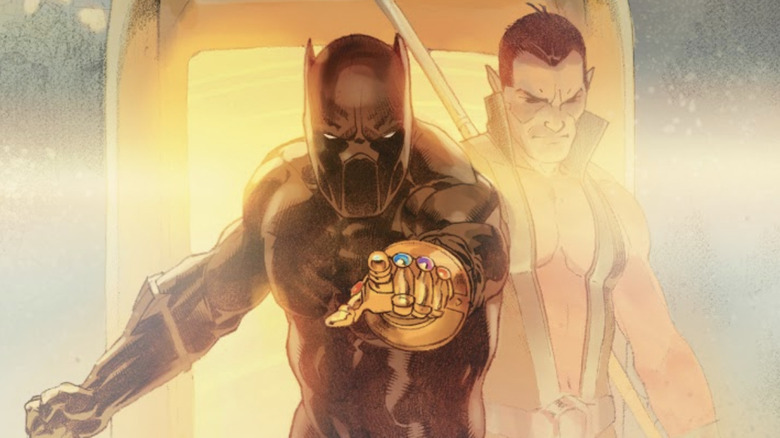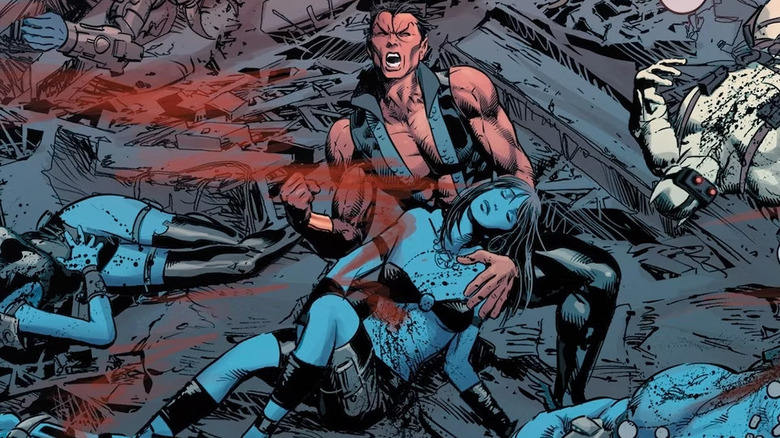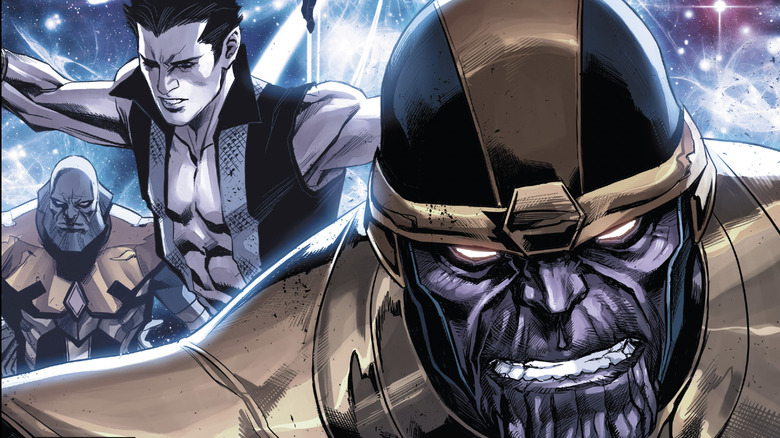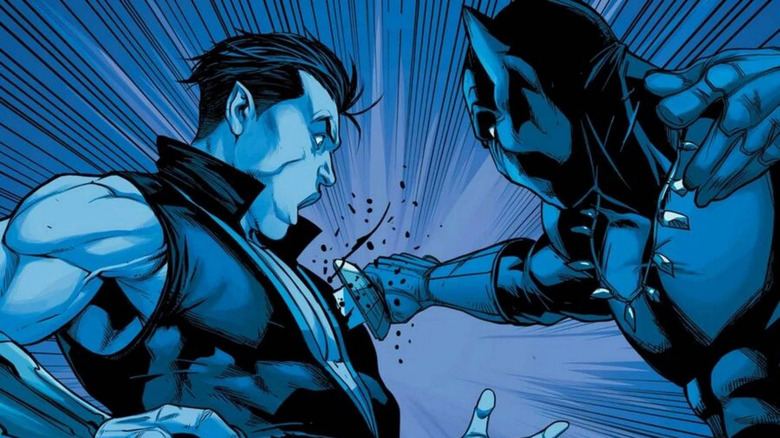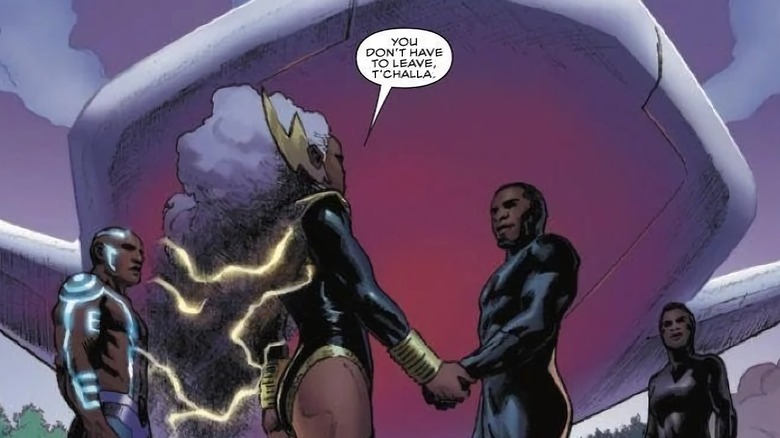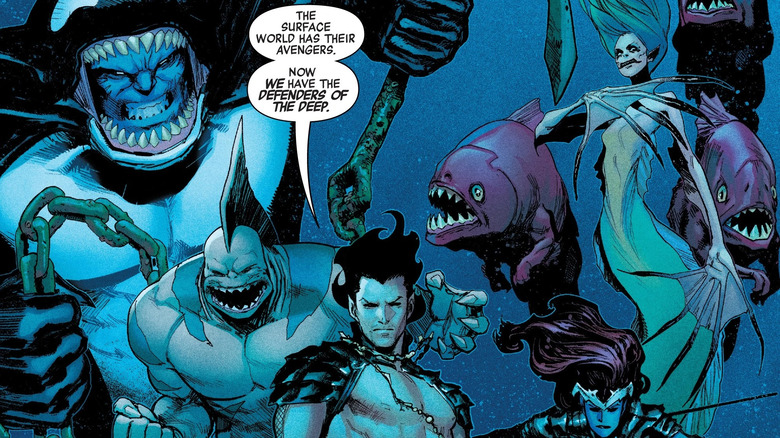Namor And Black Panther's History Explained
After the expectation-defying, box office-shattering hit that was 2018's "Black Panther," the team at Marvel Studios was both blessed and burdened with the task of creating a worthwhile sequel. Then the death of Chadwick Boseman in 2020 made that job all the more difficult and meaningful, a challenge that director Ryan Coogler has risen to and then some. "Black Panther: Wakanda Forever" is every bit the big, beautiful spectacle that the first film was, and even expands its lens to bring in influence from indigenous Mexican culture. That's thanks to the introduction of Namor, the ruler of the undersea nation of Talokan, a civilization that parallels Wakanda in its mystery, technology, and power. That leads to an epic confrontation between the two nations and their respective rulers, a war that has existed in Marvel comics for decades.
Black Panther and Namor have met time and again throughout comic book history, with their long relationship taking on almost every permutation imaginable. The complicated conflict between the two in "Black Panther: Wakanda Forever" is just one small move when compared to the elaborate chess match of their comic counterparts, so let's reveal the whole game as we look at the history between Namor and Black Panther.
Ancient, advanced civilizations
In both the Marvel Cinematic Universe and the comics that inspired it, the home nations of Namor the Sub-mariner and T'Challa the Black Panther are ancient and advanced beyond all other human civilization. Although both the cinematic and comic book versions of T'Challa hail from Wakanda, Namor is a different story. The MCU's Namor rules over Talokan, based on the Edenic city from real-world Aztec myth, while the comic book Namor rules over Atlantis, based on the location in real-world Greek myth (via Smithsonian). Though the cultural inspirations vary, many of the most important aspects of each city remain the same.
Atlantis was founded tens of thousands of years before the modern era, an island nation in the Atlantic ruled over by ancient humans (via Marvel.com). Due to a war between the Celestials and Deviants, the city sank to the bottom of the ocean, but their advanced magic helped many Atlanteans adapt to life underwater. Isolated from the rest of human society, Atlantis prospered, growing to become one of Earth's most powerful societies. Though Wakanda arose thousands of years later and came as a result of a war between gods — namely Bast and Anubis — instead of Celestials, its resulting journey parallels that of Atlantis closely. Also isolated from the rest of the world and its strife, Wakanda grew to become a technological powerhouse.
Old allies
From their very first meeting, it was clear to both Namor and T'Challa — whether or not the proud pair would admit it — that the two had an unparalleled amount in common. Both are super-powered rulers of sophisticated separatist kingdoms, both would do anything for their people, and both are motivated by strong moral compasses. Because of their similarities, it was always likely that the two would find themselves allied sooner or later. Indeed, as seen in the pages of "Rise of the Black Panther" #2, the pair embark on a mission together within minutes of their first introduction.
With Namor searching for traitorous Atlantean rebels and T'Challa hunting for missing Wakandans, they stumble upon each other by chance. Suspecting their two quests may lead to one common root, they set out together, and it isn't long before their combined resources prove their suspicions correct. The fundamentalist Atlantean terrorist Merrano and Nigandan general Zoruun were themselves allied, kidnapping Wakandan citizens in order to extract the secrets of the nation's advanced technology — for Merrano, a chance to gain an edge over Namor and for Zoruun, a chance to erase Wakanda's military dominance. As anyone who's seen "Black Panther: Wakanda Forever" is no doubt aware, the combined force of the Sub-Mariner and the Black Panther is more than enough to handle a few measly military extremists.
Old enemies
From the first few moments that Namor appears in "Black Panther: Wakanda Forever," his pride, stubbornness, and wrath are apparent, and those traits hold true throughout the character's long comic book history as well. They were just as apparent to T'Challa upon first meeting Namor, adding suspicion and even outright aggression to their first meeting and alliance.
Two resolute rulers, the pair come to blows before calming down enough to speak, exchange intel, and ally. Even when the alliance comes to a successful end, with both accomplishing their respective goals of national security, T'Challa wisely hedges his bets. Thinking to himself, "His armies can rise from the seas without warning. He now knows where Wakanda is. Namor was an ally today, but who knows what he'll be tomorrow?" Black Panther creates a file on Namor, including a psychological profile and even — almost certainly unbeknownst to Namor — a sample of Namor's unique Mutant-Atlantean DNA.
T'Challa's suspicions would turn out to be accurate, even prescient, as the subsequent history of the pair and their interactions would come to involve more than its fair share of animosity and even open war.
Members of the Illuminati
In the pages of "New Avengers" #7, legendary Marvel architect Brian Michael Bendis debuted a new team of super-beings known as the Illuminati. Originally composed of six members — Iron Man, Doctor Strange, Mister Fantastic, Charles Xavier, Black Bolt, and the Sub-Mariner — the group was revealed to be a cabal of puppet masters, secretly guiding the superhero community of Earth to prevent catastrophe. However, despite their benevolent intentions, their methods are questionable at best, which puts Black Panther at odds with them repeatedly. In fact, it's later revealed in "New Avengers: Illuminati (2006) #1" that it was Black Panther who originally founded the group, and his moral compass led him to resign.
The first meeting of the Illuminati was held in Wakanda at the dual request of T'Challa and Iron Man after the two geniuses reviewed the recent Kree-Skrull War and realized that an open exchange of information among Earth's superheroes could have prevented the whole thing. After a group discussion mutates T'Challa's information-sharing idea into a plan to create a hidden group of secret elites, the Wakandan king bows out. The split between T'Challa and the Illuminati would reach its peak later on, during the series of Multiversal Incursions leading up to "Secret Wars."
Clash over the Phoenix Force
For all Namor and T'Challa have in common, one colossal difference separates them: T'Challa is human and Namor is a mutant. Though mutants are only just beginning to appear in the MCU — most notably Xavier in "Doctor Strange in the Multiverse of Madness" and Kamala Khan in "Ms. Marvel" — they've existed in Marvel comics since the 1960s, and the rampant fear and hatred they have experienced throughout has been at the center of countless stories. One of the absolute worst spates of violence to come from this bigotry occurs in "Avengers vs. X-Men," when the nigh-omnipotent Phoenix Force returns to Earth, offering potential salvation to mutants and calamity to the Avengers.
When the Phoenix Force returns to Earth, it seemingly chooses its next host: Hope Summers, believed to be the Mutant Messiah. Many mutants, including Namor, believe this influx of cosmic power to be a grand rebirth for mutantkind, while most of the rest of Earth's heroes, including T'Challa, believe the Phoenix to be nothing but an existential threat. The resulting war envelops the entire planet and splits the superhero community in two, with Namor and T'Challa on opposite sides and repeatedly engaged in battle.
The destruction of Wakanda
As hard as it may be for fans of the Sub-Mariner to hear, especially those fans who believe the best in him will win out, the Atlantean monarch has led military invasions into Wakanda twice, both of them resulting in massive destruction and loss of life.
The first comes at the height of the "Avengers vs. X-Men" event, when a Phoenix-empowered Namor learns that the Avengers — who have plagued mutant efforts with guerrilla attacks since the Phoenix first returned — are hiding out in Wakanda under Black Panther's protection. With the newfound surge of cosmic power clouding his thoughts, Namor chooses to unleash a city-sized tidal wave on the Wakandan capital, killing countless thousands of innocent Wakandans.
The attack comes as a shock to Mutant leader Cyclops, who reacts to the news by assembling the rest of the Phoenix-empowered mutants — Emma Frost, Magik, and Colossus — and helping the Avengers to strip Namor of his new powers. The attack is unsanctioned by the mutant community and almost universally decried, resulting in Namor's removal from all major superhero (indeed, all surface-level) actions for quite some time.
Forced reconciliation
With Black Panther having assembled and then quit the Illuminati, the war between the Avengers and X-Men, and Namor's decimation of Wakanda, perhaps the last thing you'd expect to bring the pair back together is being co-members of the new Illuminati. Nonetheless, that's exactly what happens just a few months later, when the ongoing "New Avengers" series reveals a threat so dire that Black Panther puts his rage aside, offers a temporary peace between Wakanda and Atlantis, and reforms the Illuminati — Namor included.
The threat is made clear by Mister Fantastic in "New Avengers" #2. Due to a cataclysmic event in another universe, the multiverse is contracting, forcing neighboring universes together, resulting in the destruction of both. Moreover, every union — or "incursion" — accelerates the contraction, meaning sooner or later, all realities are doomed. As T'Challa himself describes the threat and his reformation of the Illuminati, "This — it is beyond me or any single one of us. So here we are, an unholy alliance that just might be Earth's only hope."
Perhaps the most telling moment in the history of Namor and Black Panther's relationship is an aside the two share during this period. Even when staring down the destruction of every known reality, T'Challa tells Namor, "When this is done — when my wants have replaced my needs... I'm going to kill you."
Shuri's revenge
During the Illuminati's months-long quest to find any possible means to prevent or even delay the universe-destroying incursions, tensions between Wakanda and Atlantis remain understandably high, even verging on all-out war. Given the volatile hostility and the ongoing threat of universal destruction, prideful Namor extends a rare olive branch to T'Challa, who despite his own pride, seems willing to accept. But peace is denied, thanks to yet another complication in the pair's already-tangled relationship: T'Challa is not the only Black Panther.
For years, dating back before "Avengers vs. X-Men," T'Challa had served as the Black Panther in an individual, superheroic capacity only. The true Black Panther, the actual ruler of Wakanda, was his sister Shuri. Unfortunately for Namor and all of Atlantis, Shuri still holds the reins throughout the incursions and subsequent "Secret War," and even more unfortunately, she detests Namor more than T'Challa ever could.
Despite T'Challa's counsel to the contrary, Shuri leads a swift, secret attack on Atlantis, reducing vast swathes of its area to rubble and murdering countless soldiers and citizens. This sudden, brutal justice evens the score in many Wakandans eyes — one massacre for another — but for T'Challa and Namor, it only serves to sour an already-fraught relationship.
Namor and Thanos' Black Order
Most of the history between Namor and Black Panther has been dominated by an alternating friend/foe relationship — the two have served together as Defenders, Avengers, and Illuminati members, but each has always kept a watchful eye on the other and their exceptional military resources. This uneasy peace has held true until the modern era, which would see the relationship devolve into a feud that plays out in a series of aggressions and retaliations, to the detriment of both of their respective countries. With pride always at the forefront of their motivations, neither Namor nor T'Challa are ever able to let bygones be bygones easily. Accordingly, Namor reacts to Wakanda's surprise attack on Atlantis by instigating a return attack on Wakanda.
With his armies decimated, Namor turns to one of the few outside forces with the power he craves: Thanos' Black Order. When Thanos' lieutenant Proxima Midnight arrives in Atlantis chasing rumors of an Infinity Stone on Earth, Namor deceives her into believing that Wakanda holds the stone and only an invasion will obtain it. As you would expect from Thanos and his armies, they waste no time in invading Wakanda, killing and razing indiscriminately, only ceasing the horror when Thanos' violent whims shift to finding his son, Thane.
Namor's last stand
The myriad examples of Namor's selfishness, vengefulness, and general aggression finally catch up with him shortly before the events of "Secret Wars," driving the final nail into the coffin of not just his alliance with Black Panther, but his relationship with the Avengers as a whole. With more and more incursions occurring at an accelerating rate, it becomes obvious to the Illuminati and the various Avengers teams that time is running out — hence the name of this comic event, "Time Runs Out." While most of the Avengers, including Black Panther, tackle the problem in the same manner as any other, Namor opts for a cosmic Hail Mary, joining forces with Thanos and his Black Order.
In the pages of "Avengers" #40, Black Panther and his fellow Avengers finally enact what they believe to be their final revenge. On a far-off space station, in between two worlds in the midst of their own mutually-destructive incursion, the Avengers ambush Namor. T'Challa stabs him in the heart, and though that isn't enough to kill the uber-powered mutant Atlantean, an added blast from Black Bolt's devastating sonic scream and a fall from the space station down to the planet's surface below surely is — at least, as far as the Avengers are aware.
Mutants: friend or foe?
The bulk of the 2000s and 2010s saw the Marvel timeline packed with an increasing amount of event comics, crossovers, and complicated continuity connections, culminating in the death of all Marvel continuity and the birth of an entirely new one in the wake of "Secret Wars." As part of that company-wide reset, the overwhelming majority of Marvel characters found their situations and relationships returned to "normal" levels, a universe closer to classic comics. T'Challa is no exception, once again the one true Black Panther and King of Wakanda, and Namor is once again the unmannerly, standoffish ruler of Atlantis — and crucially, no longer the same Thanos-allied, world-destroying villain he had been for the previous few years.
With both characters more or less back to their status quo, their war is over and their similarities are once again free to shine through. One of the most revealing similarities they have come to share in the recent age is their striking ambivalence towards the mutant community. When mutants enter a golden age by founding the sovereign island nation of Krakoa and terraforming Mars into a planet all their own, both T'Challa and Namor have faced the upheavals in similarly guarded ways. Namor, himself a mutant and even a one-time member of the X-Men, recognizes Krakoa's power and potential but refuses to join the nation, also citing its danger. Likewise, T'Challa, the ex-husband of the mutant Storm, is empathetic toward their aims but also, as an Avenger, is fearful that the mutants may be overreaching.
Modern Marvels
In 2018, writer Jason Aaron took the helm of Marvel's flagship series, "Avengers," and one of his many contributions to the team's lore is an increased focus on global politics. His Avengers are a non-national team, making their base of operations the hollowed-out body of a dead Celestial at the North Pole (no, really). With Earth's Mightiest Heroes no longer America's team, the country has instead adopted Squadron Supreme as their heroes of (the government's) choice, and other countries have done likewise — Russia has their Winter Guard, Canada has Alpha Flight, Krakoa has its X-Men, and so on.
As Chairman of the Avengers and King of Wakanda, Black Panther commands both the Avengers and his Agents of Wakanda, and — not to ever be outdone, especially by T'Challa — Namor and Atlantis have the Defenders of the Deep. Each of these national super-teams have their own unique relationship to each other, but Namor's and Black Panther's are perhaps the most similar in their stance towards the rest. Both exist almost exclusively to protect from intrusions into their hidden, sacred domains (and in the case of the Agents of Wakanda, to help their king take care of that big, dead Celestial — no, really). Both Atlantis and Wakanda are unusually guarded in their relationships to others and equally unusually quick to vengeance. It's those shared traits that make conflicts like the one featured in "Black Panther: Wakanda Forever" inevitable.
